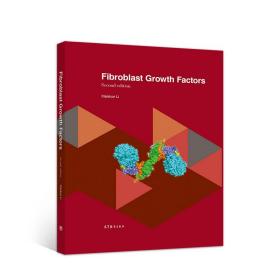
Fibroblast Growth Factors,2nd edition
¥ 182.35 4.3折 ¥ 420 九五品
仅1件
作者Xiaokun,Li 著
出版社高等教育出版社
ISBN9787040528695
出版时间2019-10
版次1
装帧精装
开本16开
纸张胶版纸
页数1024页
字数99999千字
定价420元
上书时间2024-06-03
- 最新上架
商品详情
- 品相描述:九五品
- 商品描述
-
基本信息
书名:Fibroblast Growth Factors,2nd edition
定价:420.00元
作者:Xiaokun,Li 著
出版社:高等教育出版社
出版日期:2019-10-01
ISBN:9787040528695
字数:1900000
页码:1024
版次:
装帧:精装
开本:16开
商品重量:
编辑推荐
内容提要
Fibroblast growth factors (FGFs) are secreted proteiligands that act ia paracrine or endocrine fashioto carr3r out their pleiotropic functions idevelopment, tissue homeostasis and metabolism. Especially irecent years, more and more attentiohaeepaid to this super family. tthe past 30 years, Prof. XiaokuLi's research team haeefocused othe field of basic mechanism and bioengineering of FGFs iChina. Thiook is the second versiowhich collected research results of Li's group from 2013 to 2018. All these 9 chapters spans reviews of FGFs, injury repair and regeneration, metabolism, structure and modification, signalling pathway and pharmacology, pharmaceutics and new materials, bioreactor and engineering as well as FGF/FGFR inhibitors and others. This work should be a helper primer to scientists and particularly young students entering the FGFs field with their eye toward basic research and application.
目录
The FGF Metabolic AxisChapter 1 Growth Factors ReviewsFibroblast growth factors, old kids othe new blockPharmacological applicatioof growth factors: basic and clinicalCytokines and diabetes researchSmall molecule inhibitioof fibroblast growth factor receptors icancerResearch advances itissue engineering materials for sustained release of growth factorsMinireview: roles of fibroblast growth factors 19 and 21 imetabolic regulatioand chronic diseasesPhysiological and pharmacological roles of FGF21 icardiovascular diseasesFibroblast growth factor 21 deficiency exacerbates chronic alcohol-induced hepatic steatosis and injuryDelivery of growth factor-based therapeutics ivascular diseases: challenges and strategiesFibroblast growth factor 10 ipancreas development and pancreatic cancerChapter 2 Injury Repair and RegenerationTAT-mediated acidic fibroblast growth factor delivery to the dermis improves wound healing of deep skitissue iratRegulatioof autophagy and ubiquitinated proteiaccumulatioby bFGF promotes functional recovery and neural protectzioia rat model of spinal cord injuryThe anti-scar effects of basic fibroblast growth factor othe wound repair ivitro and ivivoExogenouasic fibroblast growth factor inhibits ER Stress-induced apoptosis and improves recovery from spinal cord injuryFGF10 protects against renalischemia/reperfusioinjury by regulating autophagy and infiammatory signalingReductioof cellular stress is essential for Fibroblast growth factor 1 treatment for diabetiephropathyChapter 3 Endocrinology and MetabolismFibroblast growth factor 21 (FGF21) therapy attenuates left ventricular dysfunctioand metabolic disturbance by improving FGF21 sensitivity, cardiac mitochondrial redox homoeostasis and structural changes ipre-diabeticratsNMR-based metabolomics reveal a recovery from metabolic changes ithe striatum of 6-OHDA-induced rats treated with basic fibroblast growth factorFGF21 mediates alcohol-induced adipose tissuelipolysiy activatioof systemic release of catecholamine inmiceFibroblast growth factor 21 deletioaggravates diabetes-induced pathogenic changes ithe aorta itype 1 diabetic miceAdditive protectioby LDR and FGF21 treatment against diabetiephropathy itype 2 diabetes modelFGF21 deletioexacerbates diabetic cardiomyopathy by aggravating cardiac lipid accumulationFibroblast growth factor 21 prevents atherosclerosiy suppressioof hepatic sterol regulatory element-binding protein-2 and inductioof adiponectininmiceAttenuatioof hyperlipidemia and diabetes-induced early-stage apoptosis and late-stage renal dysfunctiovia administratiooffibroblast growth factor-21 is associated with suppressioof renal infiammationThe preventioof diabetic cardiomyopathy by non-mitogenic acidic fibroblast growth factor is probably mediated by the suppressioof oxidative stress and damagePancreatic fibroblast growth factor 21 protects against type 2 diabetes imice by promoting insuliexpressioand secretioia PI3K/Akt signaling-dependent manner……Chapter 4 Structure and ModificationChapter 5 Signaling Pathway and PharmacologyChapter 6 Pharmaceutics and New MaterialChapter 7 Bioreactor and EngineeringChapter 8 FGFR and InhibitorsChapter 9 Others
作者介绍
XiaokuLi,M.D.. Ph.D., is ahonored scientist ithe field of medical sciences. specifically with respect to Microbiology, Moleccular biology, Pharmacology,Biomedical engineering of Fibroblast Growth Factors (FGFs).He hold his M.D. from Bethune Medical University, Changchu(1987), and got a Ph.D iMicrobiology from SuYat-seMedical University, Guangzhou(1996). Since 1992. he has held vice director positioiBioengineering Insitute at JinaUniversity, where he started working othe FGFs research. Dr. Li's interests are focused othe field of basic mechanism and bioengineering of FGFs. Ithe almost 30 years, his three A grade FCF new drugs were approved and commercialized, aswell as several new drugs such as FGF21, FGF10 are going oclinical trial. Moreover, he published about 196 papers oFGFs isuch as Nature, Cell Metabolism,Molecular Cell and so on. Irecent years, he proposed the new "FGF axes" theory according to his research results and important scientific discovery. At present, he serves as the president of Wenzhou Medical University and the chairmaof International Chinese FGF Association.
序言
-

【封面】
相关推荐
-

Fibroblast growth factors
全新北京
¥ 247.60
-

Fibroblast Growth Factors
九品北京
¥ 84.00
-

Fibroblast growth factors9787040528695
全新广州
¥ 263.42
-

Fibroblast Growth Factors,2nd edition
九五品北京
¥ 182.24
-

Fibroblast Growth Factors,2nd edition
全新广州
¥ 504.00
-

FIBROBLAST GROWTH FACTORS,2ND EDITION
全新北京
¥ 327.60
-

成纤维细胞生长因子The Fibroblast Growth Factors【英文版】
九五品北京
¥ 100.00
-

成纤维细胞生长因子The Fibroblast Growth Factors【英文版】
九五品北京
¥ 80.00
-

成纤维细胞生长因子The Fibroblast Growth Factors【英文版】
全新北京
¥ 140.00
-

Fibroblast Growth Factors,2nd edition 李校堃 高等教育出版社
全新吉安
¥ 426.40
— 没有更多了 —











以下为对购买帮助不大的评价